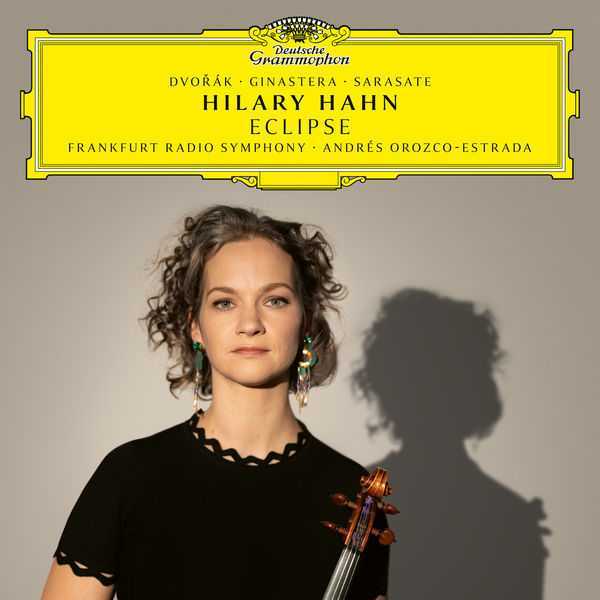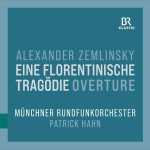

Composer: Antonín Dvořák, Alberto Ginastera, Pablo de Sarasate
Performer: Hilary Hahn
Orchestra: Frankfurt Radio Symphony Orchestra
Conductor: Andrés Orozco-Estrada
Format: FLAC (tracks)
Label: Deutsche Grammophon
Catalogue: 4862383
Release: 2022
Size: 794 MB
Recovery: +3%
Scan: yes
Dvořák: Violin Concerto in A minor, Op. 53
01. I. Allegro ma non troppo
02. II. Adagio ma non troppo
03. III. Finale. Allegro giocoso, ma non troppo
Ginastera: Violin Concerto
04. Ia. Cadenza
05. Ib. Studio I – Per gli accordi. Allegro
06. Ic. Studio II – Per le terze. Allegretto
07. Id. Studio III – Per gli altri intervalli. Lo stesso tempo
08. Ie. Studio IV – Per l’arpeggiato. Lo stesso tempo
09. If. Studio V – Per gli armonici. Andante
10. Ig. Studio VI – Per i 24 quarti di tono. Larghissimo
11. Ih. Coda. Maestoso
12. II. Adagio per 22 solisti
13. IIIa. Scherzo pianissimo. Sempre volante, misterioso e appena sensibile
14. IIIb. Perpetuum mobile. Agitato ed allucinante
Sarasate: Carmen Fantasy, Op. 25
15. Introduction. Allegro moderato
16. I. Moderato
17. II. Lento assai
18. III. Allegro moderato
19. IV. Moderato
The brand new album from the three-time Grammy Award-winning violinist Hilary Hahn. Her most personal album to date, recorded immediately after lockdown, the album was recorded with the Frankfurt Radio Symphony and Andrés Orozco-Estrada, and features Dvořák’s and Ginastera’s Violin Concertos as well as Sarasate’s Carmen Fantasy.
“This album is my return after an extended time out of the spotlight. Rediscovering my voice felt like the time following an eclipse; artistic evolution can come from many sources, but it is often set in motion by big events that bring about a change of perspective and reveal one’s true self.” – Hilary Hahn
For this new recording made immediately after the lockdown period, American violinist Hilary Hahn offers up a truly original programme—just how she likes it. One surprise is the inclusion of Alberto Ginastera’s (1916-1983) Violin Concerto, Op. 30. Despite being a major Argentine composer during the twentieth-century, Ginastera’s work has been sorely under-promoted. His flamboyant, personal masterpieces are written for orchestra, piano and even the stage (e.g. Bomarzo).
Ginastera intially stands out for his ‘sublimation’ of traditional South American heritage. In every corner of his writing, he incorporates Argentinean dance rhythms, with their very specific metres (tango, milonga, gato, etc.), and applies them to an inventive and uniquely personal orchestration. The Argentinean’s orchestra was an instant hit, and it has maintained its powerful sonic singularity ever since. In the early 1960s, Ginastera’s style would become more radical as he increasingly incorporated serialist elements. The Violin Concerto dates back to this period (1963), by which time his musical language had become more sophisticated. It is surprising to note that his major concertante works (the First Piano Concerto and First Cello Concerto) were written during the 1960s: a period of intense experimentation.
In its three free-form movements, the Violin Concerto remains a challenging work both for the soloist and the orchestra. It begins with a large cadenza for the soloist and follows with a series of six ‘studii’, which each focus upon particular facets of violin playing (chords, thirds, etc.)—as if Chopin or Paganini had released their material a century later but had fleshed them out with similarly rich and colourful orchestral textures. The second movement – an Adagio per 22 solisti, fairly typical of Ginastera’s writing for solo strings – brings about a lull within the overall structure, before we enter a two-part Scherzo. This final movement ends with a Perpetuum mobile: an extremely virtuosic moment, the agitated and hallucinating tone of which is aptly inhabited by Hilary Hahn. A brilliant moment on the record.
It is surprising then to hear Sarasate’s Fantasia-Carmen – a truly disturbing contrast, but one which brings us back to a more radiant 19th century. This period is equally celebrated through the incorporation of Antonín Dvořák’s Violin Concerto, which is now being performed more and more often by 21st century violinists. In the Dvořák, Hahn and Orozco-Estrada are more sensitive to the work’s flowing form than to its pastoral or lyrical character.
An absolutely fascinating album, in any case.



